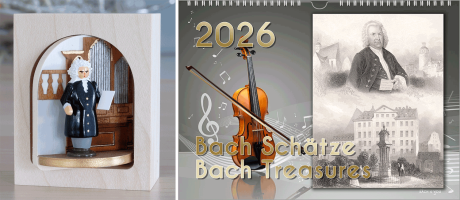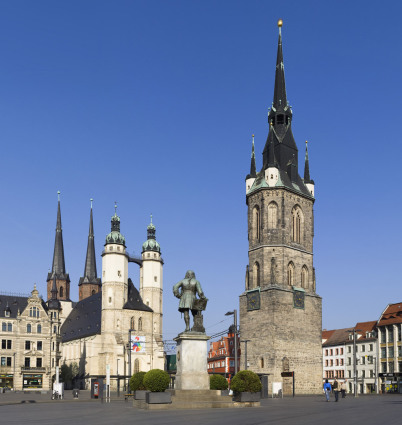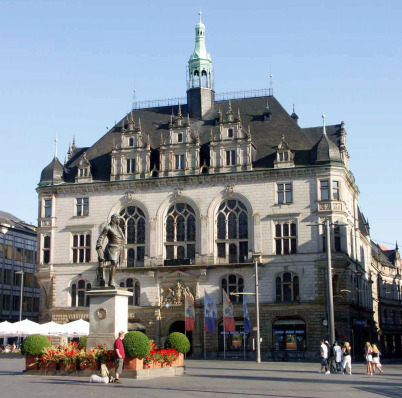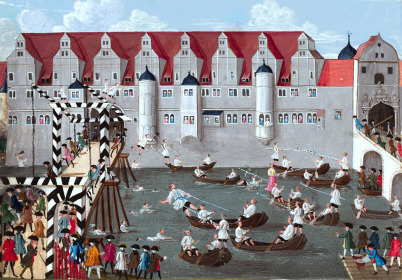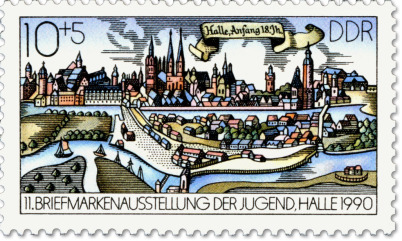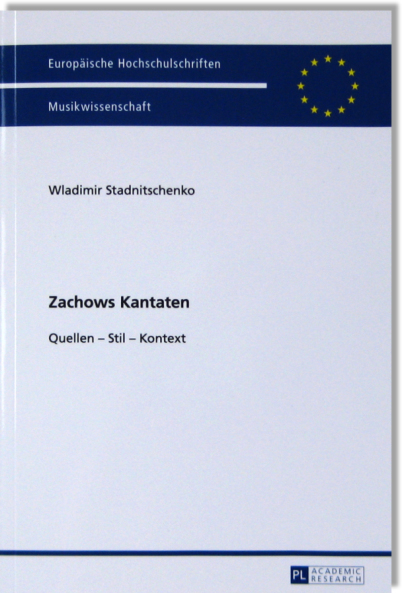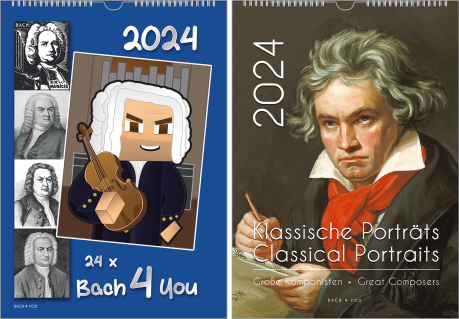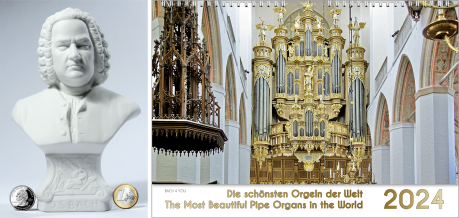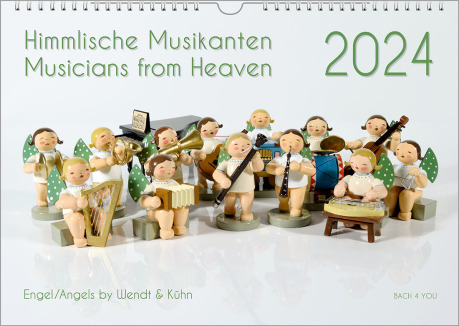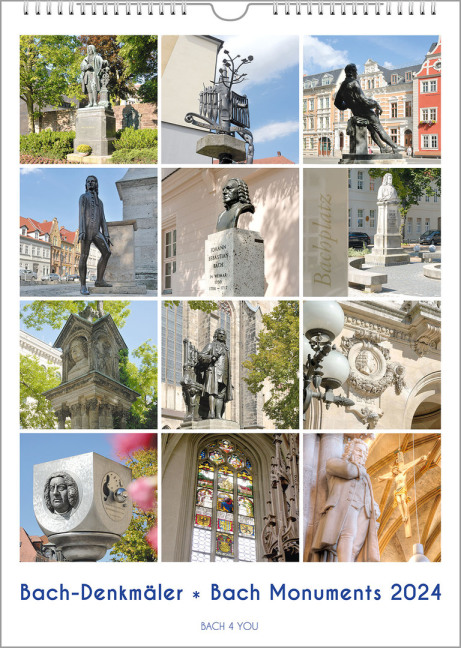Bach FAQ 114
Did Bach Actually Want to Live and Work in Halle? Why Didn't Bach Finally Move to Halle?
To the point: still today it's one of the mysteries, why Bach didn't move to Halle and worked there.
Halle, namely the Halle on the Saale, is first and foremost Handel city. But Halle is also a little bit a Bach city. A Bach city of category C. Here you can learn more about this beautiful town, for instance why it is today one of the 33 Bach locations. By clicking here you are already there. Of course, as always, there is also detailed information on Wikipedia and via Google. With the keyword "Halle", the city still presents itself higher than the wiki: here you go to the homepage of the city. With the two keywords "Handel and Halle" the Sachsen-Anhalt-Wiki, Wikivoyage and Wikitravel are on Google page 1, too. But ... Handel ... this is not the subject here and not... today for you.
Advertisement = Promotion = Commercial
1,000+ Bach Gifts and Music Gifts Are Soon 10,000+ Bach Gifts and Music Gifts
Five shops … learn more.
Bach calendars are gifts for musicians and music gifts: three sizes, EU style + US style, 2024 + 2025. To the shop.
End of Advertisement
Halle Is Handel City and Halle Is Bach City
It is also worth mentioning that "Halle + Handel" also takes her to the "Handel in Halle", to the Handel festivals in the Georg-Friedrich-Handel-Hall and to the Handel festivals on another wiki. The website of the Stiftung Handel-Haus Halle completes our offer here. In addition, there is also an article in the nmz ... the new musikzeitung. Written actually with small initial letters and in English, it's the new music magazine. The title of the article: "300 years ago: Johann Sebastian Bach wanted to become organist in the city of Handel". But I guess for that last hint you probably Google Translator.
Did Bach Want to Become an Organist in Halle? Honestly?
Johann Sebastian Bach left fans and scientists – on a regular basis and this is true in all disciplines – great puzzles to solve. The episode "A Job in Halle" has been a huge mystery for nearly 300 years. In the absence of personal J.S. Bach correspondence, it is still hidden why Bach was applying for a job in Halle ... and later he did not want it anymore. As always, when accurate facts are missing, there are probabilities. They are based on the behavior of Bach in other situations, on sources that deal with a very different subject, and in researches for persons who played a role in the surrounding of Bach. Like, for example, the organist in Halle, Zachow. And of course ... also in documentations in Halle.
Exciting at the very edge is at least the confirmed fact that Bach absolutely wanted to visit Handel in Halle and get to know him. Three times the two real great musicians were really close and three times it did not work. It is also worth noting that Handel was internationally well-known in his days, in contrast to Bach, whose popularity abroad was far from reaching Handel. And besides, it is exciting that Handel, in contrast to Bach, has been wealthy. Oh, here it goes, incidentally, to the master from Halle. First – as almost always – to Wiki. Then also to the Handel House, which in the meantime, in our time – cleansed – really something.
It is also interesting that Handel was born only a few weeks before Bach, in Halle, but he died many years later than Bach. In London. And that was 1759. Thus, according to the expectation of life back then, he became quite age-old. In contrast to Bach, who became "just" very old with 65 years of age. By the way, both music stars suffered from eye cataract, and both composers were operated by the same John Taylor from London. But now that Handel is enjoying this Bach homepage.
By Omits (Own work) [CC BY-SA 3.0], via Wikimedia Commons
The marketplace in the city of Halle today: Almost Halle would have become a Bachstadt ... of first-class quality.
By The original uploader was Bettenburg at German Wikipedia (Own work) [CC BY-SA 2.0 de], via Wikimedia Commons
In Halle, 237,000 residents are living and above all: Halle is beautiful. Bach's whole life would have been different if he had accepted this job in Halle, and he was definitely already approved for that job by the city council. You see the city house in the pic above (... not city hall).
By The original uploader was Neue Residenz e.V. at German Wikipedia. (Serresches Stammbuch.) [Public domain], via Wikimedia Commons
The Handel town of Halle: where ever Johann Sebastian Bach appeared back then, he had the enthusiasm on his side. That was true as well when he performed for the city council in the metropolis on the Saale. After all, Halle is a Bachcity of category C for that reason.
Why Did Bach Make a Trip to the City of Halle? What Do Some Scientists Think? Why Did Bach Decide Against Halle?
Who could solve a Bach puzzle better than a Bach scientist? Of course, every Bach fan, every Bach author, every Bach biographer and every Bach scientist can form his own opinion on the basis of the well-known facts. Ultimately, however, there is always a lack of convincing, written evidence for almost every thesis. And so the interpretation of Johann Sebastian Bach's application and later cancellation in this beautiful city is "flourishing". And that is true for around 300 years. Articles were written and published, and interpretations of Bach's behavior were considered. A scientist from Moscow of all people found currently by far the most likely variant on the subject of "Bach in Halle". But – we remember – nothing is easy related to the subject of Bach. This scientist and book author does not present this in a book entitled "Bach in Halle". No, the book is called "Zachow's Cantatas" and it is about a very completely different musician, namely one of the students of Handel. Absolutely nothing at all in the book title suggests that a whole of 100 pages are devoted to the subject of Bach, more precisely, the theme of "Bach in Halle" ... but ... there is a catch: you probably need the Google translator desperately, I guess.
By Hochgeladen von --Nightflyer (talk) 20:07, 18 June 2009 (UTC) (Eigener Scan und Bearbeitung) [Public domain], via Wikimedia Commons
A postage stamp published by the former DDR (GDR). It's Halle at the beginning of the 18th century. That means, both Handel and Bach were able to see the city like on the pic. Bach, however, visited Halle a few decades later.
Doctor Vladimir Stadnichenko from Moscow
Who is Dr. Vladimir Stadnichenko, and how come a Russian music scientist in Moscow, after all a trip of nearly 20-hour from Halle writes about such a German theme? And with exciting sources that prove the correctness of his remarks better than any consideration before? Read a few lines of this scientist, this doctor from Russia, Mr. Vladimir Stadnichenko, how we write his name here in Germany. By the way, if you are more interested in this expert from Moscow, you will find him – almost naturally – today on Facebook. On his German Facebook page here, on his English version here and on his Russian Facebook-Presence here.
The most exciting book in the world on "Bach in Halle" – no word on the cover or even in the title points to this treasure on the topic of Johann Sebastian Bach: 100 pages of JSB expertise. You can order the book in bookshops or directly at the Peter Lang Publishing. Here, of course, you already have the link to the book and the title for Bach lovers should actually be "Zachow's Cantatas – Bach and Halle".
Advertisement
1,000+ Music Gifts or 10,000+ Music Gifts?
The shop "Bach 4 You" is the specialist, when it comes to precious Bach figures, and it is the music calendar specialist on the planet. To the shop.
End of Advertisement
Even More Excited to Learn About Bach in Halle? Here Is a Little Bit from the Author Above for You and My Website
Almost three hundred years ago, in the late fall of 1713, the then 28-year-old official colleague, the Weimar court organist, "well-documented and honorable" Herr Johann Sebastian Bach applied for the position of the first and only teacher of Handel, Friedrich Wilhelm Zachow (1663-1712) in Halle. In attempting to check on this episode in Bach's life, you encounter many open questions – the number of which is really enormous.
The most important question still remains the following: What were the circumstances of Bach's application in Halle in the late fall of 1713? Did Bach want to apply for the position of the "Hallesche music director" and organist in Halle from Weimar? Did the Weimar court organist actually make an arrangement for organs for Christoph Kuntius? A correct answer to this question leads to the determination of Bach's sound ideal in the field of organ building.
The wrong answer has already led to the questionable idea of the fictious application in Halle, and finally to the classification of Bach as a careerist. Since CPE Bach up to this day it is known that Bach's life is handed down with many gaps. Basically, it is also true that although a great deal has been written about him, only a few documents about him are preserved. Really not much is known about his everyday life in the cities in which he lived, such as Eisenach for instance, Arnstadt, Lueneburg and Muehlhausen, as well as the others.
It is a paradoxical situation that the most important composer in the world is biographical hardly comprehensible. In this sense the short-term Halle episode from the life of Bach really does not make any other reality. It must, however, be noted that Bach's application for the vacant position of Zachow in Halle is a story in itself, which nevertheless is a special case.
On the one hand, Bach's journey to Halle is almost as little known as, for example, his journey to Luebeck in 1705. Thus, in this sense, these episodes are comparable among each other. On the other hand, the Halle episode is nevertheless a real exception. This even applies to the whole of his life context, for the following reason: No other story in Bach's life has ever been so thoroughly misunderstood and therefore misinterpreted that much as Bach's application for the vacant Zachow position in this late fall of 1713. The main problem here is that this episode is far too little documented, and the story remained incomprehensible to some authors. A concrete reason for Bach's first trip to Halle is by no means apparent from the two "Hallesche Briefe" ("Halle letters"), not from the file notes, as well as not from the accounts of the Marienkirche (St. May Church). The exact travel purpose is still unknown.
A serious, careful new expert review of the historical facts and documents obtained is convincing in the following and summarizes the following:
1. In the late fall of 1713, J.S. Bach didn't make a trip to Halle because of the application for the position of Zachow.
2. Bach was invited to Halle to play for the organ builder Christoph Kuntzius, and at that time back then he also came to Saale city to offer an expertise as an organ expert with an expert advice in the field of organ building, possibly also a partial examination.
3. Bach's second invitation to Halle – in May 1716 – had already been planned in a written form by organ builder Kuntzius as early as 1712 (... see item no.14 in the organ building contract of Kuntzius from this year 1712).
4. It was a great surprise for J.S. (Bach) that after the accomplishment of this issue with the new organ construction the "highly educated senior pastor Johann Michael Heineccius", who created canatat texts himself, persuaded him (Bach) to apply for the above mentioned position and handed him (Bach) his own text for the cantata.
Bach accepted this application with a one-year delay as a fifth candidate (!). It seems likely that Zachow's student Georg Kirchhoff, who had a connection to the organ builder Kuntzius – Kirchhoff was by the way considered candidate 1 with this application – has also personally participated in Bach's invitation to Halle in 1713. They do not know exactly which cantata Bach had composed in Halle in 1713. With Alfred Duerr, I believe (... since the telephone conversation with him in April 1997) that it could have been his cantata "Christians etch this day", BWV 63. However: with a different than the known text, which is unknown until today!
Who Actually Is This Author?
Wladimir Stadnitschenko, born in Moscow, is diploma holder at the Tschaikowsky State Conservatory Moscow. He received a doctor's degree at the "Musikwissenschaftliches Seminar" (... music scientific seminar) in Freiburg, Germany (... with Prof. Christoph Wolff) and he works in the music pedagogical and cultural section in Russia.
Again Back to the nmz – the New Music Newspaper – In German Written with 3 Low Letters
Here you can read the whole report on Bach's ideas in Halle. It's a pity it's available only in German. Or you stay here and treat yourself with the summary. In 1713/1714 Bach was actually accepted by the council of the city hall after his audition in Halle. But he did not take the place – and no one knows why not. Since the summer of 1712, more than a year after the death of the previous organist Wilhelm Zachow, the office was unoccupied ... a note that others had already "jumped off" or did not want to start from the beginning and Bach did the same thing like those?! The payment is said to be the reason, Bach was not happy with the amount he was offered. Is it really the reason? In the necrology about J.S. Bach, Bach's son-in-law and even his son, Philip Emanuel Bach, did not write anything related to that issue. Did this have a reason and it was not the amount of his salary?
It was not until 1717 that Bach changed from Weimar to Köthen ... a direct dislike, like later with his departure in Weimar, so could have been less reason for Bach's interest in the position in Halle.
It is said, that the men and women of the town council were penny pinchers, that is what the nmz writes – now you remember what nmz is, right? – and that could actually have been the reason not to look for a new organist immediately. A half year would be as usual mourning for the regent King Friedrich I the explanation. Or my reflection above.
192 Florins is what they wanted to pay Bach, instead of 210, which he received in Weimar at that time. That alone would have been a blatant facial loss for Bach, who was offered at least twice more money with the next contract in a further place than in the last job, but also more than the musicians before him in the same place got. In addition to this – as you can still read in historical documents today – that Bach actually, yes actually should not have been allowed to have additional income – by playing at festivals, weddings, and funerals. The gentlemen of the council in Halle thought this was questionable. Then – in these weeks – Bach got 30 florins more in Weimar, that is 240.
At this point, I am convinced that you should visit the nmz, if you are suddenly interested in the topic even more. Because there the article about Bach in Halle is edited to perfection. And afterward... yes afterward... you will find out at Dr. Vladimir Stadnichenko – here again in the spelling in Germany – and about the Peter Lang Publishing Group – a completely different, still young, current view of things. However, for both suggestions, it would be better if you check on your current German before.
Advertisement
99 Music Calendars, Composers Calendars and Bach Calendars ... Yes ... and Angels Calendars
There are many more music calendars beyond the 99 European style music calendars … learn more.
Discover the Difference Between Calendars in Europe and Calendars in the US
A Bach calendar and a Bach monuments calendars: three sizes, European style or US style, 2024 + 2025. To the shop.
End of Advertisement

